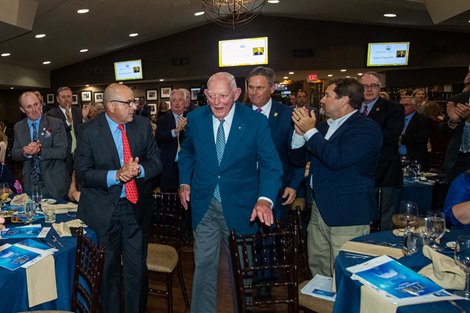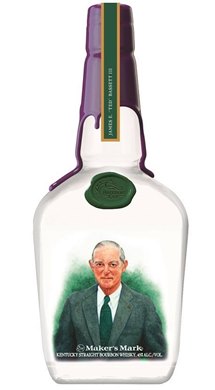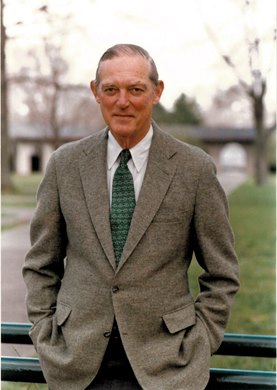After James E. “Ted” Bassett III. In his house in Lexington had lived a life that was celebrated because of his extraordinary achievements and breathtaking longevity, he died on January 23. He was 103 years venerable.
Bassett led the Keeland Association of Lexington in a variety of capacities for decades: President from 1970-86, Chairman of the Board of Directors from 1986 to 2001 and trustee from 1993 to 2006. Conservative organization commissioned an era of state -of -the -art technology and innovation.
Even after he had reached 100, Bassett reported every weekday in his office in Keeland Cottage. There, surrounded by photos, statues and memorabilia between world leaders, license fees and celebrities, Bassett entertained a steady series of visitors and well-wishers, from Keeland President to maintenance staff. His intellectual curiosity was steadfast and he talked to every person about their field in the thoroughbred world.
Keeland was only one of the positions that defined Ted bassett's life. He primarily identified as the Navy of the United States. At the end of 1944 he was shipped as part of a Raider battalion in the Pacific Theater, which specialized in amphibian operations during the Second World War.
“Being in the Marines is a life -changing experience that you never forget,” Bassett said in 2006 to Bloodhorse. He was aware of his entire life to maintain the ramrod-in-sequence of a navy and to avoid using a sugar cane in his last years. He headed the fundraising campaign for the founding of the National Museum of the Marine Corps in Quantico, VA. One of them is in the Kentucky Horse Park.
Register Bloodhorse Daily
Sergeant ruthlessly served with bravery
Once asked why he was honored with the honor of SGT. Ruthent struck with his fists at the conference table of the Keeland Cottage and roared: “Why am I involved? Because she was not a horse; she was a marine!”
Ted Bassett in Keeland
Ted Bassett was born on October 26, 1921 and grew up in downtown Lexington, as the son of a strict disciplinary father, who led Greentree Stud for the Whitney family. At the age of 12 he was sent to the Kent School, a boarding school in Connecticut, which anchored a strict, spartan, curved Spartan. He spent three years at Yale University before volunteering for the Marine Corps during the Second World War.
After the war, bassett Lucy Gay, a native Central -Kentucky, married a variety of jobs to drive up and down the eastern coast for the Great Northern Paper Company. Finally, the couple returned to the Bluegrass region of Kentucky, where Bassett undertook a brief career as cattle, sheep and tobacco farmer. A friend, Pete Widener, recruited him to join the Kentucky State Police. Bassett finally became director of the KSP, another life -defining experience.
There he helped to enforce school integration, the open housing construction and helped those who were disappointed by natural disasters. He reformed everything from the uniforms of the officials to the design of the police cars, increased the salaries and founded the college for justice and safety of the Eastern Kentucky University.
“I was very forceful about the need for an improved selection and training standards and discipline,” he said. “I thought I would stay for six months. I did 11 years.”
Keeland President Louis Lee Haggin II hired Bassett as his assistant. Bassett joked: “Things could not have been doing so well there if they had to bring in these police officers to monitor it.”
Two years later, he took over the presidency of Keeland. In all aspects of Keeland's physical work, a rapid expansion and a thorough renovation, from clubhouse and grandstands to modern barns followed on the back and improvements of the sales pavilion.
Bassett was an enthusiastic supporter of the Keeland Library, which is now a jewel of the thoroughbred world and houses the largest archive and the collection of resource material for authors, researchers, reporters and fans.
Bassett was much more than an isolated bureaucrat. He would regularly travel to race tracks across the country with advertising material and enter the backrest to send coaches and owners to the gigantic races of Keeland. He enjoyed participating in all aspects of the industry.
“The race was lucky enough to have him, because Ted would have been successful in every dimension of life that he had chosen,” said Charles Cella, his lifelong friend, 2006.
Bassett was particularly pleased to organize visiting dignitaries and remembered the rest of his life when his time initiated Queen Elizabeth II on the grounds of the Keeneland. Elizabeth Taylor was another who left an indelible impression on him.
“Mr. Bassett was an estimated member of the Keeland family, and although we are gloomy of his death, we celebrate his remarkable life and his indomitable spirit,” said Shannon Arvin, President and CEO of Keeland. “He was the embodiment of classes and integrity, and his commitment to the preservation of the Mission and Brand of Keeland, often in the challenging times in history, made it possible for our racing and sales companies to rise to modern heights.
“Mr. Bassett was internationally as a leader, visionary, philanthropic, beloved icon and friend and one of the greatest ambassadors of our sport. He wanted him to work as a modest man who worked every day to improve Keeland, the thoroughbred industry and his hometown of Lexington.”

Bassett receives a constant ovation on the way to maintaining the industry service for the owners and the Breeder Association Award at the Toba National Awards Dinner in Lexington.
In addition to Keeland, Bassett was President of the Breeder 'Cup for eight years and was dynamic in practically every industry organization. He was a trustee of the National Museum of Racing and Hall of Fame and the American Horse Council. a jockey club steward; and chairman of the Kentucky Horse Park and from Equibase. In 1996 Bassett received an Eclipse Award Award for his contributions to the shop. And two years later, the Lord Derby Award received from the English media.
Bassett regarded donations as a necessary component to achieve the well -being of the good, and enjoyed his talent, others to do things to do things. His efforts contributed to supporting the establishment of Maxwell H. Gluck Equine Research Center at the University of Kentucky. He was instrumental in collecting 2.7 million US dollars for the acquisition and rescue of the Calumet Farm Trophy collection, which was in danger of being auctioned off by piece. The Kentucky Horse Park now houses the collection and honored Bassett with an exhibition of his life in 2014. Five years earlier, Bassett and the author Bill Mooney produced a biography entitled “Keeland's Ted Bassett: My Life”.

In 2020 Maker's Mark Bassett honored with a narrow bottle
In 2019, Bassett was included in the National Museum of Racing and Hall of Fame as a pillar of the lawn.
He never stopped helping his hometown and led a fundraiser to build or update several YMCA facilities in Lexington. It was also the driving force for the recording of the funds for the construction of the Central Kentucky Blood Center. He particularly enjoyed living with his wife on the Lanark Farm in her family in Woodford County. The family supported other local organizations there, including the Woodford County Humane Society.
In his later years he liked to take cruise holidays and held long -time friends like Cella who heard it Oaklawn Park; And Richard Duchossois, who had owned Arlington Park. Cella died in December 2017 and Duchossois died in January 2022.
Ted Bassett is survived by his sister -in -law Anne Pinckney Gay; Nephew James Edward “Ted” Gay; And nieces Elizabeth Gay Freeman, Charlotte Gay Stings and Anne Gay Donworth.
The visit will take place from January 27 from 3 p.m. to 7 p.m. in the Keeland Clubhaus. A funeral service will take place on January 28th at 11 a.m. in the Central Christian Church in 205 E. Compact Street in Lexington. There will be a private funeral.


